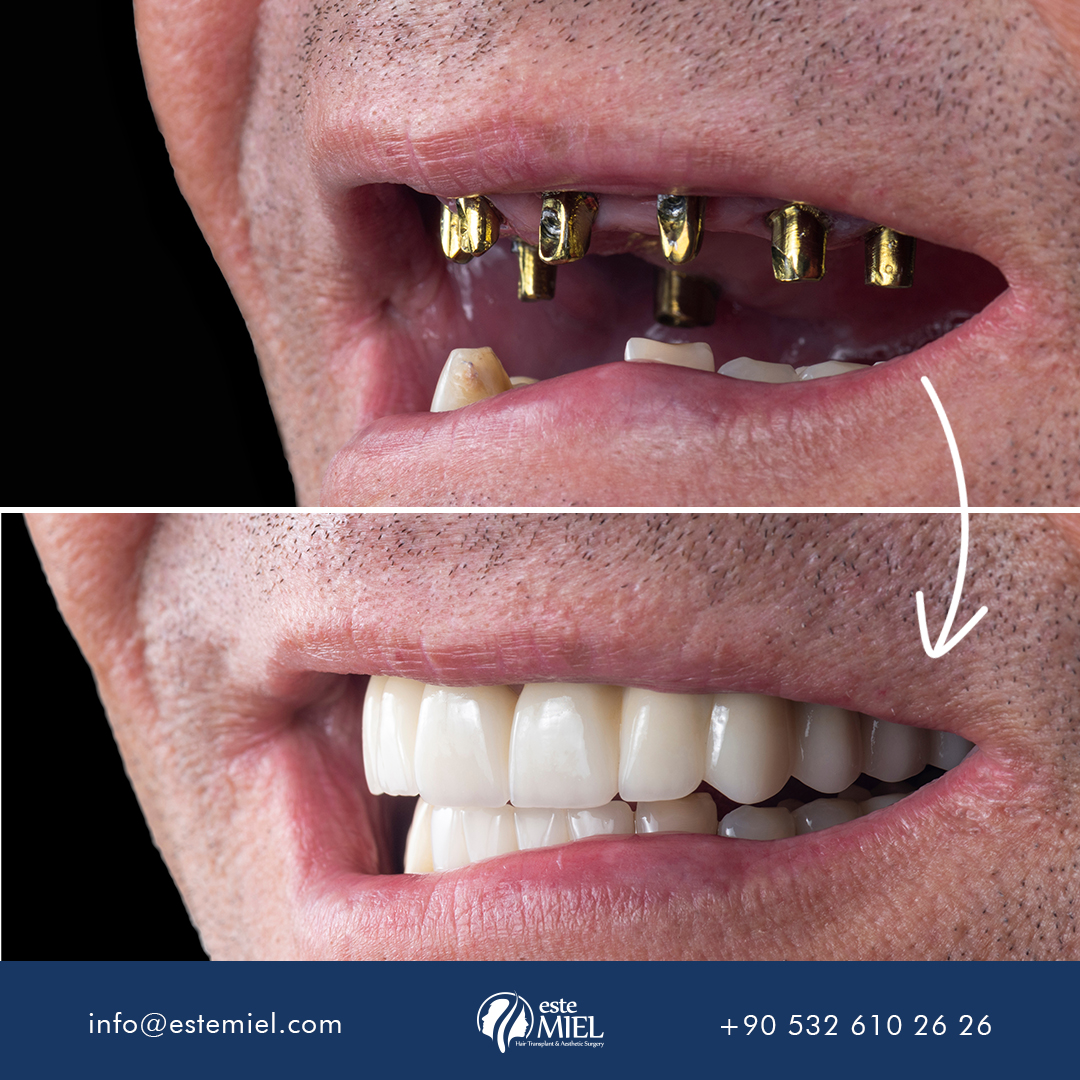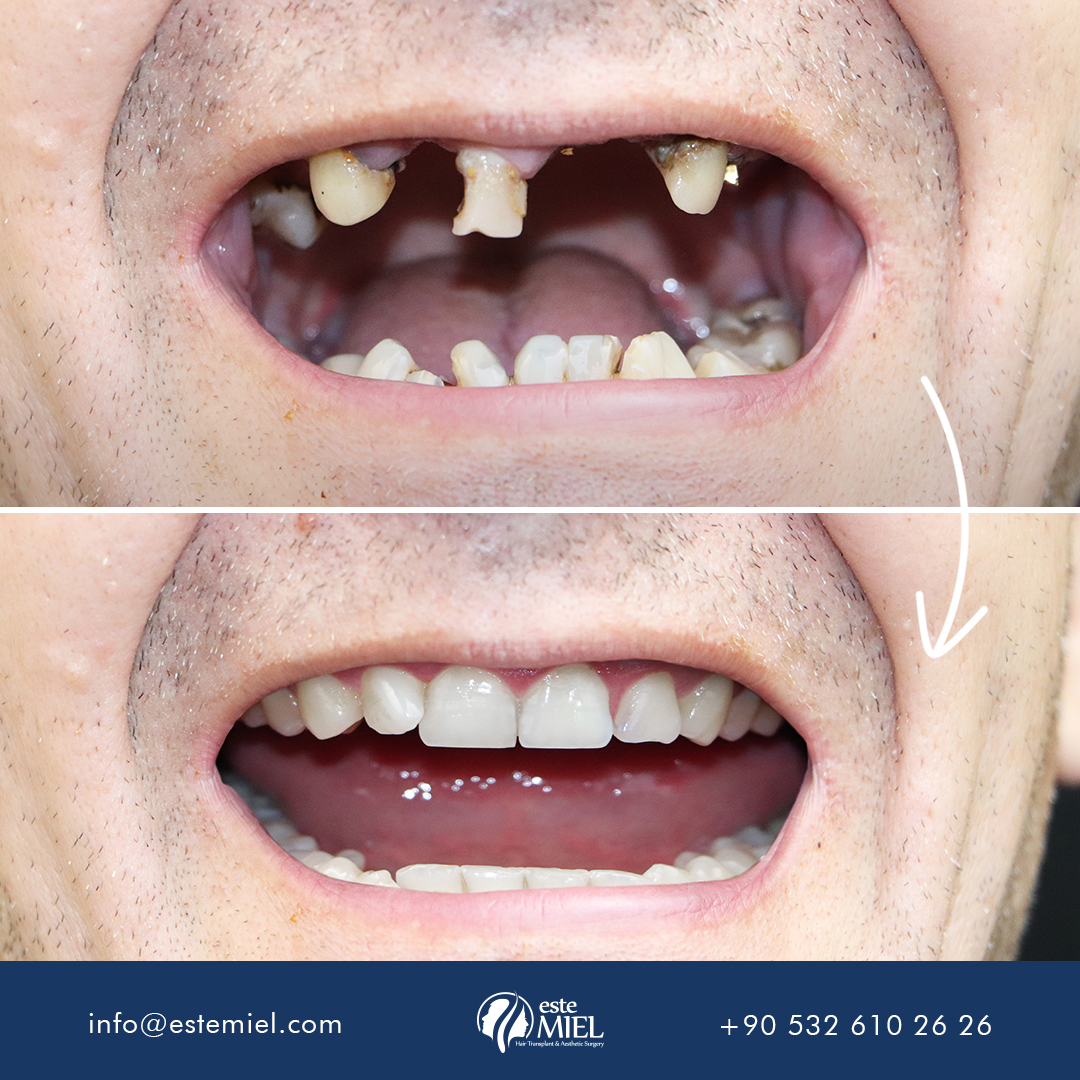Implant
Screws made of titanium for the treatment of missing teeth are called implants. The implant process, completed by placing a dental prosthesis on the screws, does not cause any damage to other teeth. After the implant procedure, you can eat comfortably like with your natural teeth.
Today’s implant treatment options offer you a wide range of advanced dental possibilities to regain your chewing ability, dental aesthetics, enjoyment of food, health, and quality of life.
Anyone who is 18 years of age or older and has completed their jaw and facial development can have an implant. Before the implant procedure is performed, it is checked whether the jaw structure of the person to be treated is suitable for the implant. After this procedure, which is done by taking X-rays, the procedure is started when there is no problem.
People who use blood thinners should stop using the medicine before the procedure. Implants are performed for people with diseases such as osteoporosis after receiving the appropriate treatment.
- - Before the implant application, the patient is given mild sedation, and the procedure is started.
- - A detailed examination and an x-ray are performed.
- - Measurements of the jaw bones and remaining teeth are taken.
- - After the implant is placed, it is covered with the gum and left to heal.
- - After the healing process is completed, the prosthetic heads are attached.
- - There is a recovery period of 3 months for the lower jaw and 6 months for the upper jaw.
- - In some cases, newly made teeth can be placed on the implants immediately.
- - With this implant, the patient can comfortably eat, laugh, and talk.
The implant is made from tissue-friendly elements like titanium, which are placed in the jawbone to restore the function and aesthetics of the missing teeth. They are artificial tooth roots made from valuable materials.
Zirconium implants are generation implants produced to increase the resistance of implants made of titanium. It is used to increase endurance, especially for narrow jawbones. Apart from this, there is no difference from titanium other than durability.
More beautiful smiles are waiting for you with the implant process, which is one of the most important developments provided by modern medicine…
Implants function much more like natural teeth than dentures. Implants are supported by the bone, not gum tissues, allowing 90 percent of chewing force to be restored when functioning with natural teeth.
Not at all. Since the replacement tooth or teeth covers the entire implant post, no one will know you have dental implants unless you tell them. Implants do positively affect the cosmetic appearance of your teeth; however dentists look more at the health and functionality benefits that will be made possible.
Not usually, most implant procedures are completed with a local anesthetic in office. Other sedation methods may also be available. The only circumstances a brief hospital stay may be necessary is if a patient’s health is compromised or a complex surgical procedure is required.
Implants can usually be placed in only one or two visits, with some cases fully completed in less than six weeks. However, the total length of the process is determined by factors such as length of healing time, type of implant and type of tooth replacement. When your initial procedure is completed, you’ll be fitted with temporary teeth allowing you to eat and function normally. Once you are fully healed, you’ll return to receive your new permanent teeth.
Implants are placed surgically. Surgery time and what post-surgical care will be necessary depend on the complexity of the case and type of implant selected. After the procedure, you will be prescribed medication and receive recommendations the benefit your comfort and healing time.
Anesthesia provided during the procedure will prevent any pain or discomfort. Afterwards, medication for pain, swelling or to prevent infections will be prescribed as well. Recovery times can vary. Many only experience swelling and don’t need pain medication after the procedure. A soft food diet will be necessary for a few weeks, which allows your implants to heal. After that, you can enjoy your favorite foods again.
Placing your permanent replacement(s) depends upon your healing time. This also depends upon the type of implant placed and whether or not the implant is allowed to osseointegrate – implants that heal into the bone. With most endosseous implants, the replacement tooth or teeth can be constructed within a few weeks of surgery and then placed once the implant is fully healed.
The possibility of infection occurring in areas around implants is the same for natural teeth. Practicing good oral health will help prevent infection. In addition, since implants are made from biocompatible materials, the normally are not rejected by the body.
The longevity of implants depends upon certain factors such as your oral and overall health, condition of your bone structure and jaw and how well the implants are taken care of. Although no definite time frame can be given, healthy individuals who practice good oral hygiene typically enjoy the benefits of implants for many years.


Helpline
You can reach us directly via our social media accounts, WhatsApp or phone number.